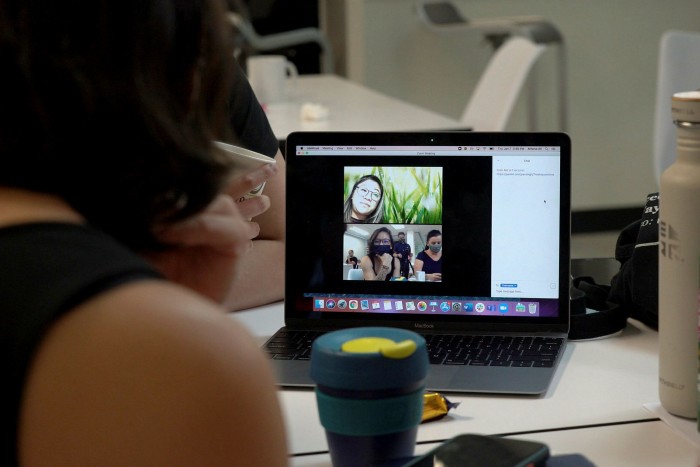Executive education contenders with a different angle
The coronavirus pandemic has accelerated several societal shifts that had been presently taking place, these kinds of as distant doing work. Variations in the way executives are educated to make improvements to their management expertise are no exception.
The sector that was formulated by common business faculties presently confronted new competition ahead of the wellness crisis designed experience-to-experience teaching unattainable in significantly of the world. The evolution of different providers these kinds of as Hyper Island, THNK, MindGym, Cegos and Lumina Studying — giving courses on the internet or at metropolis-centre web-sites in the vicinity of offices — reflects alterations in how men and women want to analyze that had been taking put ahead of on the internet became the only solution.
Likewise, opportunities presently existed to analyze purely on the internet, with website platforms these kinds of as 2U, Coursera, Udacity and edX giving courses aimed at the business sector.
FT Government Education directories 2021
This new world centered on on the internet shipping and delivery suited several organisations established in the electronic age, where website-conferencing and application-based studying had taken keep, suggests Andrew Crisp, proprietor of Carrington Crisp, a business schooling research expert. He thinks that the sector simply just achieved a “tipping point” in the crisis.
“Covid was not the induce of improve in govt schooling, but it has been the accelerator,” he suggests. “A good deal of these new entrants have further pockets than the business faculties, via their personal backers giving them with the dollars to commit. They have been far more rapidly with engineering adoption and they comprehend the have to have for accredited training course certificates that mean a thing in a corporate context, relatively than just a piece of paper.”
The new govt schooling providers argue they have strategies of teaching staff members better suited to 21st-century doing work procedures, enabling men and women to just take classes in metropolis-centre spots effortless for offices and outside workplace hrs. Nonetheless, the pandemic and lockdowns have made challenges even for these education businesses.
Hyper Island, which started out in 1996 in a converted prison in Karlskrona, Sweden, and now operates in six nations, from Brazil to Singapore, marketplaces by itself as a hipper, additional adaptable version of a business college. But, like lengthier recognized institutions, it was disrupted by Covid-19. It experienced a 60 for each cent drop in revenue from experience-to-experience programmes in Europe in spring 2020 due to the fact quite a few campuses had been compelled to shut and vacation bans intended college students could not get to web-sites that had been open.
The response was to swap to on the internet. “Our cohorts are super intercontinental, so we are definitely dependent on open borders,” suggests Helena Ekman, chief govt. “Luckily we had for the prior five many years operate a product line of on the internet courses, but we understood we could not just set everything on Zoom. As a substitute, we redesigned courses, spacing out the studying by developing reflective intervals among dwell sessions.”
Income was down 12 for each cent for the calendar year, but desire picked up as Hyper Island redesigned and prolonged courses as on the internet encounters. By the conclude of 2020, the variety of contributors on its courses was 44 for each cent higher globally than in the prior calendar year. In the Asia-Pacific area, numbers had been up 135 for each cent.

“It is not less expensive or less difficult to set points on the internet,” Ekman adds. “But commercially it has assisted us, as we had been capable to welcome men and women to our courses and programmes who wouldn’t have been capable to be part of us if we had been just teaching experience to experience.”
Decoded is a education business established in 2011 with the purpose of demystifying the on the internet world. Its courses are intended to explain sophisticated new systems to workforces in available strategies, assisting them turn into additional productive. The London-based edtech venture expanded its headcount on the again of greater revenues in 2020, though some consumers delayed taking courses, in accordance to co-founder and co-chief govt Kathryn Parsons.
“We had been usually capable of offering education virtually the issue was regardless of whether our consumers would adapt to distant studying — which they did with impressive simplicity and speed,” Parsons suggests. “Every client was impacted and reacted to the pandemic in a different way. It was a story of organisations both pulling ahead and rising commit on tech — in certain, details expertise and expertise to overcome challenges or grasp opportunities — or it was a situation of delaying programmes to 2021 while restructuring and firefighting.”
Dutch foodstuff retailer Ahold Delhaize signed up Decoded to educate about 350 of its senior leaders on four electronic-recognition workshops, intended to demystify builders, hackers, details experts and innovation, and to aid technological and non-technological personnel comprehend a single a further.
Ahold Delhaize also sends executives on management programmes at Harvard Company Faculty but did not see the Decoded deal as a option among a common govt schooling establishment and an different supplier, in accordance to Ben Wishart, Ahold Delhaize’s worldwide chief info officer. Nonetheless, the corporation warmed to Decoded’s unconventional model.
“What designed Decoded various was that the men and women carrying out the education are lively practitioners,” suggests Wishart. “When they are not education they are offering electronic initiatives. The shipping and delivery model is additional the Ant and Dec of electronic transformation than it is formal principle-based schooling,” he adds, referencing the upbeat British isles truth television display hosts. “The contributors could not do just about anything but be drawn in and master.”
Even though Decoded trades on a additional casual model of teaching than common institutions, consumers expect the corporation to be just as rigorous in proving the business situation for short courses as a business college, in accordance to Parsons. “The tension to supply a measurable return on investment decision, not just to the learner but to the business, is turning out to be significantly important,” she suggests. Decoded’s “Data Academies” are now currently being operate for additional than thirty organisations worldwide.
Finally, the sector will be huge adequate for equally business faculties and the different providers, in accordance to Fadi Khalek, edtech venture spouse at venture funds fund World-wide Ventures. “Those corporations that generate business versions where you can fork out as you master, and are spreading out into emerging marketplaces in Asia and Latin America, are the ones threatening the business faculties,” he suggests.
The micro-credential (qualified short training course) and on the internet degree sector is really worth $117bn and growing 10 for each cent every year, in accordance to schooling details corporation HolonIQ. “It is a huge chance,” suggests Khalek.
This report has been amended to display that World-wide Ventures is a venture funds fund.




